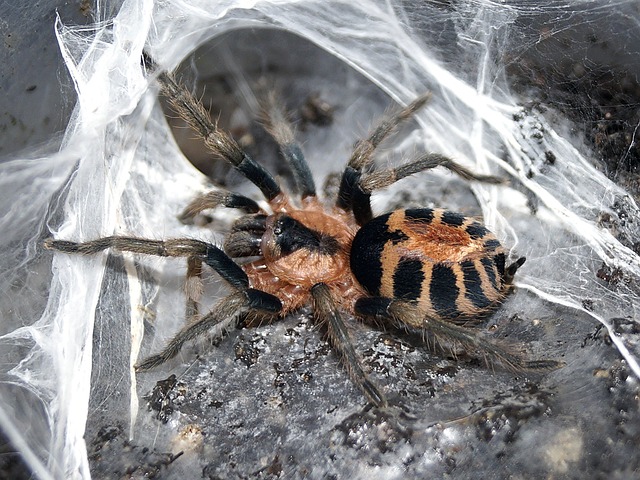Spiders thrive in dark, cluttered spaces with hiding spots and prey, so preventing them requires a multi-pronged approach. Declutter outdoor areas, seal entry points, use natural repellents like essential oils, and encourage natural predators. Eco-friendly spider prevention solutions disrupt their behavior without harm to humans or the environment. Physical barriers like mesh screens and regular cleaning significantly reduce spider presence. Regular maintenance, monitoring, and eco-friendly traps are crucial components of a successful strategy.
Tired of sharing your outdoor space with unwanted spiders? Discover effective, eco-friendly spider prevention solutions that minimize their activity without harmful chemicals. This comprehensive guide delves into understanding spider behavior and habitat, exploring organic treatments and natural repellents. Learn the power of physical barriers and the importance of regular maintenance for a spider-free environment. Implement these strategies to transform your outdoor oasis.
Understanding Spider Behavior and Habitat
Understanding Spider Behavior and Habitat
Spiders are essential components of any ecosystem, but their presence in our living spaces can be unsettling. To effectively minimize spider activity, it’s crucial to understand their behavior and habitat preferences. Spiders generally seek dark, secluded areas where they can build webs and trap prey. They are attracted to places with plenty of nooks and crannies, such as cracks, crevices, and cluttered spaces. By identifying these preferred habitats in your outdoor environment and removing potential attractions, you can significantly deter spiders from setting up camp.
Eco-friendly spider prevention solutions focus on non-toxic methods that disrupt their natural behavior without causing harm to humans or the environment. This might include regular cleaning and decluttering, sealing entry points, using natural repellents like citrus oils or mint, and promoting natural predators like birds and insects. By combining these strategies, you can create a less appealing environment for spiders while maintaining a balanced outdoor ecosystem.
Eco-Friendly Outdoor Treatments to Deter Spiders
When it comes to keeping spiders at bay, opting for eco-friendly outdoor treatments is a smart and responsible choice. Traditional pest control methods often rely on toxic chemicals that can be harmful to both your family and the environment. However, there are numerous natural solutions available that effectively deter these arachnids without causing any damage. One such approach involves using essential oils known for their spider-repelling properties. Peppermint, lemongrass, and lavender oils are popular choices; their strong scents act as natural barriers, making your outdoor spaces less appealing to spiders.
Another eco-friendly strategy is implementing physical barriers like fine mesh netting or protective screens around areas prone to spider activity, such as patios or garden beds. Regular cleaning and maintaining a clutter-free environment also plays a significant role. Spiders are attracted to dark and secluded spaces, so keeping your outdoor spaces well-lit and free of debris can significantly reduce their presence. These simple yet effective methods offer a sustainable way to manage spider populations while ensuring the safety and health of your loved ones and the local ecosystem.
Implementing Physical Barriers and Natural Repellents
Implementing Physical Barriers and Natural Repellents is an effective way to minimize spider activity in outdoor spaces, offering a safer and more environmentally friendly alternative to chemical treatments. Eco-friendly spider prevention solutions include installing physical barriers like mesh screens or fine metal wire netting around windows, doors, and vents to prevent spiders from entering your living areas. These physical obstacles are nearly impenetrable for arachnids while allowing fresh air circulation.
Natural repellents, on the other hand, can be used in conjunction with physical barriers. Essential oils like citronella, peppermint, and tea tree oil have been shown to deter spiders naturally. Sparing these scents around problem areas, such as entry points or spider habitats, can help keep them at bay without resorting to potentially harmful chemicals. Using these eco-friendly methods not only reduces the risk of human exposure to toxic substances but also minimizes the environmental impact.
Regular Maintenance and Monitoring for Effective Spider Prevention
Regular maintenance and monitoring are key components of an effective spider prevention strategy. Eco-friendly spider prevention solutions involve a combination of simple, natural practices that can be integrated into your routine outdoor care. Regularly trimming bushes and trees keeps spiders from using them as entry points to your home or property. Additionally, maintaining a clean and clutter-free environment reduces hiding spots for spiders.
Monitoring is another vital aspect. Inspecting areas around your home, such as door frames, windowsills, and garage doors, can help identify potential entry points. Using eco-friendly insect traps or sticky barriers can also assist in capturing spiders early on. Regular checks ensure that any spider activity is detected promptly, allowing for swift action to prevent infestations from escalating.
By understanding spider behavior and implementing a combination of eco-friendly outdoor treatments, physical barriers, and regular maintenance, you can effectively minimize spider activity. These targeted strategies not only deter spiders but also ensure a safer and more comfortable outdoor space without resorting to harmful chemicals. Adopting these eco-conscious spider prevention solutions is a proactive step towards maintaining a healthy balance in your environment.
